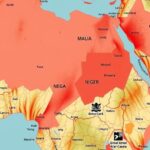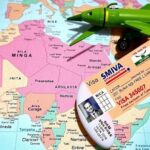Mali, Burkina Faso, and Niger Implement Joint Passport System for AES
Mali, Burkina Faso, and Niger will issue a common passport for their Confederation of Sahel States, effective January 29. This move follows their withdrawal from ECOWAS a year ago, prompted by military coups and dissatisfaction with the bloc’s support against terrorism. The existing ECOWAS passports will remain valid during a transition period, as the AES prepares to forge new alliances and combat regional insurgency.
Mali, Burkina Faso, and Niger have officially announced the introduction of a common passport for their newly formed Confederation of Sahel States (AES). This initiative is set to take effect on January 29, marking the one-year anniversary of their withdrawal from ECOWAS, following a series of military coups that led to the establishment of the AES.
The three nations exited ECOWAS on January 29, 2023, citing a lack of support in their battle against terrorism and alleging the regional bloc’s allegiance to France, their former colonial ruler. Although their withdrawal was declared immediately, ECOWAS regulations mandate a transition period of one year before such actions are fully realised.
Malian junta leader and AES president, General Assimi Goïta, confirmed the passport announcement on state television, stating, “The AES passports will be issued from 29th January.” The existing ECOWAS passports will remain valid until their respective expiration dates, and AES citizens possessing these passports may opt for new AES versions.
In conjunction with the passport rollout, the AES is also establishing a 5,000-member force to address the ongoing regional insurgency issues. Since the military coups, the three countries have distanced themselves from France and are fostering new political and military alliances with Russia and other nations.
While ECOWAS passports afford member state citizens visa-free travel, it remains doubtful whether AES nationals will be required to obtain visas for regional travel after January 2025, following the expiration of the transition period.
Mali, Burkina Faso, and Niger formed the AES after each experienced military coups that led to strained relations with ECOWAS and its perceived preference for French influence. The introduction of a common passport signifies a significant pivot for these nations towards self-sufficiency and cooperation among themselves in addressing regional issues, particularly security challenges posed by insurgent groups.
In summary, the introduction of the AES common passport marks a pivotal development in West African diplomacy and security. This initiative not only reinforces the sovereignty of Mali, Burkina Faso, and Niger but also reflects their strategic realignment away from ECOWAS and towards new partnerships in the face of shared challenges.
Original Source: newscentral.africa








Post Comment